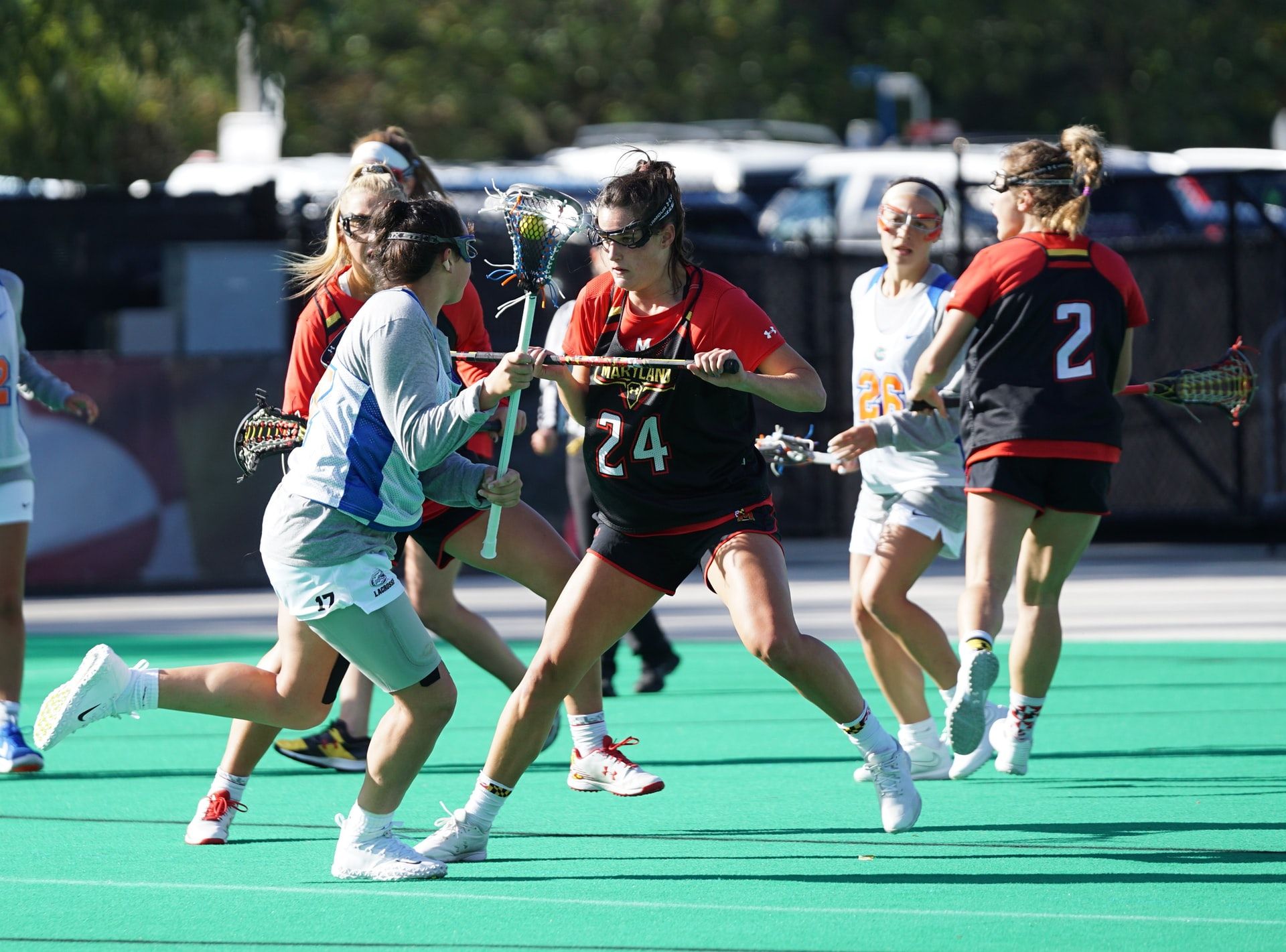
We recently filled up two webinar sessions on mental toughness, with over 500 college and high school coaches and athletes showing up to learn from Champion’s Mind creator Dr. Jim Afremow. During the webinars, attendees asked a lot of great questions about mental toughness, finding flow on game day, athlete mental health during COVID-19, and more. In this post, Jim answers the first seven, with more to come in next week’s post.
1. What are a few quick ways that coaches can show and reinforce mental toughness to our athletes?
Coaches need to model and mimic championship-level behavior in terms of verbal and non-verbal communication. As a coach, you’re a leader who sets the tone for your entire team. So when it comes to mental toughness, it’s important that you display the 4 Cs that are the building blocks of this essential skill: composure, confidence, commitment, and concentration.
How do you model composure when adversity strikes? Do you welcome challenges or do you complain about them and get rattled, tense, and uptight? If your players can see that you remain calm and composed in the most difficult situations, they’re more likely to do the same. To inspire confidence in your team, have a big smile on your face on game day. Show that you trust them to go and play their best because they’re prepared and ready. And tell them, “There’s no other team I’d rather coach. We can beat anyone in the nation if we play our game.”
Commitment comes into focus when everything isn’t going as planned. Maybe your team is in a slump or several of your star players are out injured. In these cases, remind your athletes of the common goals you’re striving toward and that you can only achieve them if you stick together. Through all the ups and downs, demonstrate that you’re committed to them, have their backs, and believe in them. Then weather the storm as a unit. Concentration is all about staying in the moment and not getting stuck on the past. Instead of overreacting to a bad call or mistake, clap and offer some words of encouragement. This will show your players that you’ve moved on and that what matters isn’t the last shot, but the next one.
2. I noticed that you just added a "flow" section to the Champion’s Mind app. What mental toughness aspects should I practice to ensure I get into flow on race day?
One is committing to deliberate practice. Fully focus on every drill and rep, and resolve to get one day better, every day. The more the big game day is just like practice, the more likely you are to get into a flow state. So train as if it’s competition rather than waiting to turn it on when it's game time. The greatest champions like Michael Jordan and Larry Bird don’t just want to win the game but also to dominate in practice, which is a hallmark of their mental toughness and meant they could go out and express themselves in games because nothing was different.
A second key for finding your flow on game day is to cultivate an attitude of gratitude. The more grateful you are for the privilege and opportunity to play your sport, the more you’ll enjoy it. Entitlement ties you up in knots, but gratitude frees you up to perform your best. Remind yourself that you want to be here, you’ve worked hard to get to this point, and you’re thankful to be doing what you love most.
Another way to get into the zone is to nail your pre-performance routine. Maybe you create a certain playlist to listen to, goof around with your teammates, or visualize what you’re about to do (which is a key module in the Champion’s Mind app course). Find what works best for you and stick with it.
3. A lot of my athletes are dealing with mental health challenges right now due to COVID-19 like stress, anxiety, and feeling down because now they can't have sports as their outlet. Are you able to help with this as well?
You cannot have a Champion’s Mind without mental health, so in the app we take a 360-degree approach to helping support athletes above the neck. This includes devoting an entire module of our course to mental health topics like worry, stress, and anger management. All the other skills and strategies – like positive self-talk, visualization, and body language – will also help keep you in a good frame of mind and help you deal with whatever challenges you’re facing in your personal life. We want people to feel their best off the field so they can perform their best on it.
It’s crucial to not be too proud to ask for help when you need it. This could mean reaching out with vulnerability and honesty to a friend, family member, coach, or teammate. Sometimes an issue is more serious and you should seek out a professional like a counselor or psychologist. All too often, we try to work out our issues on our own, but this doesn’t succeed very often. So if you know something’s not right, be proactive and find someone to come alongside you.
4. What type of mental skills did you use to help the combat fighter you worked with so that he could come back and win the rematch against the world champion after losing against him the first time?
He lost in a pretty brutal fashion in the first fight, so he had to overcome that in his head. We worked a lot on the 4 Cs that I mentioned earlier. For him to picture himself winning the rematch, he had to visualize putting the previous bout 100 miles behind him. That way, he could see himself winning and regain confidence in his ability. In terms of concentration, he put aside all distractions and had a laser-like focus. He was totally committed to his comeback and did everything he needed to go into the ring fully prepared. During the second fight, he sustained an injury early on and just kept telling himself, “Composure, composure, composure.” That helped him push through the pain and win the fight as much with mental firepower as what he did to his opponent physically.
5. What can my team do to handle pressure that comes from poor performance? For example, if we had a huge lead in a basketball game, the other team made a comeback, and now we have to make the game winning shot?
The key for coaches and athletes to remember is that in any competition, there are going to be good and bad stretches. You should try and stretch out the former as far as you can and minimize the latter. One of the fun things about a game is that you’re going to make your run and then the other team is going to make theirs. Rather than resisting that, try to embrace it as the natural ebb and flow that you expect going in.
Remind your players that they’re at their best at the end of the game when it matters most. You want to be known as a team who comes through in the clutch and finishes strong. So learn to enjoy having your back against the wall and fighting hard to the final whistle. Relish the challenge and be confident that you’re going to prove yourself when everything is on the line. Don’t blink or hesitate – just go out and make your final run.
6. What's the best way to teach our kids mental toughness?
As I said earlier, the best way for parents, teachers, and coaches to teach mental toughness is to model it. You can’t give away what you don’t have. It's important for you to work on all the same mental skills and strategies in the app that you ask your kids to develop daily. It’s also key to remind children that you want them to have fun. That’s what the mentally toughest athletes do, even at the highest level. So encourage your kids to go out and play free, loose, and with joy.
If you’re a coach, tell your young players that the goal for today is to go out and have more fun than the other team. I’m not talking about goofing off – it should be fun with the purpose of playing their best. Things get too serious too often in youth sports, which leads to kids becoming anxious, tense, and uptight. We need to remind them why they’re out there in the first place – because they love the game.
7. How can coaches help athletes develop mental skills during the practice or preparation phase so that they translate into competition and performance?
I often tell clients that mental skills are not magic skills. You can’t just turn them on like a light switch when it’s game time, but rather need to practice them daily. Even a few minutes can make a big difference if you’re consistent. From a coach’s perspective, you can assign your athletes modules in the Champion’s Mind course and even certain audios. Then have team discussions in which players share what they’re learning. Ask them how they can apply it to practice today.
So for example, if they just listened to an audio on self-talk, what are they going to say to themselves to make the most of each drill today? Or if they’re going into a game, what can they say in their head to bounce back if they make a mistake? As the coach, it’s up to you to emphasize that mental skills must be practiced just as often as physical skills and are at the heart of everything your team does.
Wish Your Team Was Mentally Tougher?
Mental toughness is one of the 12 modules of an exclusive course which is included with a Champion’s Mind app team license. Want to learn more? Then drop us a line now.
Or if you’re an athlete, you can start boosting your mental toughness by downloading the app for your Apple or Android phone.
